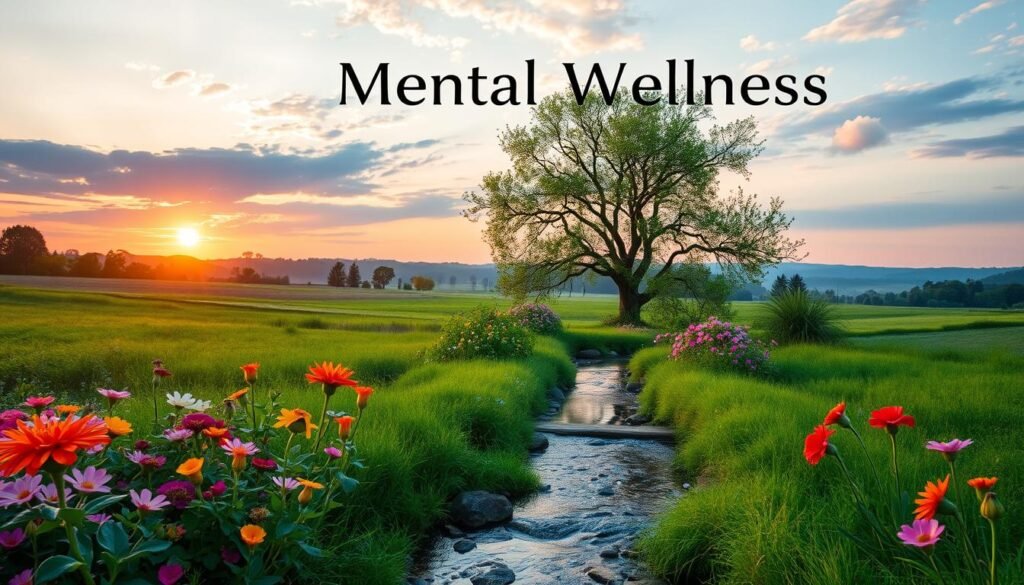Can our thoughts and mindset truly shape our emotional well-being? As we explore the link between depression and the mind, a key question arises: Is the path to mental clarity and healing within our grasp? This guide will dive into the latest from neuroscience, cognitive therapy, and holistic wellness. It aims to help you understand mood disorders and boost your emotional resilience.
We’ll look at the brain’s role in depression and effective self-care strategies. This article is your guide to a transformative journey. Get ready to debunk myths, learn about the mind-body connection, and find practical ways to achieve mental clarity and emotional well-being.
Understanding the Neuroscience of Depression
Exploring the brain’s details, we learn about depression’s roots. It’s about brain chemistry, neural paths, and how our brains change. This knowledge helps us understand why depression happens and how to get better.
Brain Chemistry and Mood Regulation
Depression is linked to an imbalance in brain chemicals like serotonin and dopamine. These chemicals control our mood. When they’re off, we might feel sad, tired, and lose interest in things. Studying brain chemistry helps us understand the pure mind life.
Neural Pathways and Emotional Processing
Our brain’s networks play a big role in how we feel. In depression, these networks can get mixed up. This makes it hard to handle emotions. Knowing about these networks helps us find better ways to treat depression and bring depression and the mind: pathways to clarity and healing.
Neuroplasticity and Recovery
Our brains can change and adapt, a process called neuroplasticity. This is key for treating depression. By using neuroplasticity, treatments can help create new, better paths in the brain. This leads to depression and the mind: pathways to clarity and healing.
“Understanding the neuroscience of depression is essential for developing effective treatments and fostering lasting recovery.”
Depression and the Mind: Pathways to Clarity and Healing
Dealing with depression needs a mix of emotional and mental strategies. Cognitive therapy is a key way to find healing.
Cognitive therapy is a powerful form of talk therapy. It helps people change negative thoughts that lead to depression. This therapy lets people see things more clearly and take back control of their minds.
Mindfulness is also a big help for those with depression. It teaches people to be aware of now without judgment. This helps them deal with their feelings better.
Combining cognitive therapy and mindfulness helps people find ways to handle depression. They learn to use tools like journaling and deep breathing. These help them stay calm and strong.
“The greatest weapon against stress is our ability to choose one thought over another.” – William James
By using these methods, people with depression can start a journey of self-discovery. They can find emotional balance and a new purpose in life.
The Role of Cognitive Therapy in Mental Health Recovery
Psychotherapy has become a key part of mental health recovery. Cognitive therapy is a powerful tool within it. It helps people change negative thought patterns, building resilience and improving mental health.
Identifying Negative Thought Patterns
The first step in cognitive therapy is to spot negative thought patterns. These can lead to depression and other mental health issues. Clients learn to recognize and understand these patterns, seeing how they affect their feelings and actions.
Restructuring Mental Framework
With a therapist’s help, clients start to see things differently. They learn to challenge irrational beliefs and replace negative thoughts with positive ones. This helps them break free from self-defeating patterns.
Building Cognitive Resilience
As therapy progresses, clients grow stronger mentally. They learn to handle tough times better. They develop tools to manage stress and control their emotions.
“Cognitive therapy is not about changing your circumstances, but about changing the way you think about your circumstances.” – Aaron T. Beck, the father of cognitive therapy.
Cognitive therapy helps people take back their mental health. It fights depression and builds resilience. This approach lets clients actively work on their mental health, leading to lasting change.
Mindfulness Practices for Emotional Balance
Mindfulness practices are key for emotional well-being and a pure mind life. They help us stay present and care for ourselves. This section explores how mindfulness can balance our emotions and improve our mental health.
Meditation is a core part of mindfulness. It helps reduce stress and boosts self-awareness. By focusing on our thoughts and feelings without judgment, we can find peace. This peace is crucial for emotional well-being.
Deep breathing exercises also help with emotional balance. They calm our nervous system and reduce stress signs. This easy practice can be part of our daily life, helping us care for ourselves and keep a clear mind.
Mindful awareness makes us fully present in the moment. It connects us to our senses and experiences. This awareness helps us understand our emotions better, making us more resilient.
“Mindfulness is the ability to be present, to rest in the here and now, fully engaged with whatever we’re doing in the moment.” – Jon Kabat-Zinn
Embracing mindfulness practices starts a journey to emotional well-being and a clear mind. It teaches us to be aware of ourselves, manage our emotions, and stay present. This way, we can handle life’s challenges more easily and find inner peace.
Mindfulness offers a deep and easy way to find emotional balance and inner peace. By adding meditation, deep breathing, and mindful awareness to our daily life, we can grow in self-care and clarity. This leads to a more fulfilling and pure mind life.
Lifestyle Modifications for Mental Wellness
Good mental health comes from many choices we make every day. This part looks at how changing our lifestyle can help our mental health. We’ll focus on exercise, sleep, and what we eat.
Exercise and Brain Health
Exercise is a strong ally against depression. It makes us feel better by releasing endorphins. It also helps our brain stay flexible and sharp, improving how we think and feel.
Sleep Hygiene Importance
Good sleep is key to taking care of ourselves and our minds. It helps our brain deal with feelings and get ready for the next day. Not getting enough sleep can make depression worse. So, it’s important to sleep well and have a bedtime routine.
Nutrition and Mood Connection
What we eat affects our mood. Eating foods that are good for our brain helps us feel better. Foods rich in omega-3s, B vitamins, and antioxidants are especially helpful. But, eating too much junk food can make us feel down.
By making these lifestyle changes, we can improve our mental health. We become stronger and more balanced in our minds.
“The greatest weapon against stress is our ability to choose one thought over another.” – William James
The Impact of Social Connections on Mental Health
Keeping strong social ties is key for emotional health and resilience. Studies show people with good support networks face less depression and anxiety. They also handle life’s ups and downs better.
Being part of social groups gives a sense of belonging and emotional support. It also lets people try out coping strategies and grow stronger. Talking to friends and family can teach new ways to solve problems and feel more in control.
Building deep relationships through gatherings, online groups, or volunteering can deeply affect emotional well-being. These ties help fight off feelings of loneliness and isolation. These feelings often lead to depression and other mental health issues.
“Strong social connections not only enrich our lives, but they also serve as a powerful tool for maintaining good mental health and fostering resilience in the face of adversity.”
By focusing on building and keeping social bonds, people can improve their overall well-being. They create a network that supports them through life’s highs and lows with more confidence.
- Engage in regular social activities to build and strengthen connections.
- Reach out to friends and family for emotional support and to share experiences.
- Explore opportunities to join local community groups or volunteer organizations to expand your social circle.
- Utilize online platforms to connect with like-minded individuals and participate in virtual communities.
Nurturing social connections helps create an environment that boosts emotional well-being, supports coping strategies, and increases resilience.
Integrating Professional Support and Self-Care Strategies
Getting better mentally often needs both professional help and personal care. Mixing these two can lead to a full recovery from depression.
Finding the Right Therapeutic Approach
Psychotherapy is key in the fight for mental health. Trying out different therapies, like cognitive-behavioral or psychodynamic, can help find the cause of depression. A good therapist offers a safe place for growth and learning.
Building a Support Network
Having a strong support group is vital for mental health. This can be friends, family, support groups, or mental health experts. A good network gives a feeling of belonging and helps in tough times.
Creating Personal Wellness Plans
- Make a self-care plan that includes psychotherapy, self-care, and coping strategies.
- Focus on healthy habits like exercise, good food, and sleep for mental and physical health.
- Try different coping strategies like mindfulness, journaling, or hobbies to handle stress.
- Keep updating your wellness plan to fit your changing needs and goals.
Using a mix of professional help and personal care can start a journey to better mental health.
Breaking the Stigma: Understanding Depression as a Medical Condition
Depression is a common mental health issue that often leads to misunderstandings. It’s important to see depression as a real medical condition that needs treatment and support. By learning more about depression, we can work to reduce stigma and create a more caring society.
The World Health Organization says depression affects about 264 million people worldwide. It’s a serious mood disorder that makes people feel sad, hopeless, and lose interest in things they used to enjoy. Symptoms can include changes in sleep, appetite, and energy, as well as trouble concentrating and making decisions.
Depression is not a sign of weakness or a personal failing. It’s a medical issue caused by genetics, biology, and environment. Like any illness, depression needs professional help to manage its symptoms and aid in recovery.
“Depression is not a weakness, it’s a medical condition that requires attention and care.” – Anonymous
Effective treatments for depression include therapy, medication, and lifestyle changes. It’s crucial to work with a mental health expert to create a treatment plan that fits each person’s needs.
By learning and sharing what we know about depression, we can help reduce stigma. This creates a supportive environment for those struggling. Together, we can raise awareness and encourage people to seek help without fear of judgment.
Holistic Approaches to Mental Well-being
Looking for emotional well-being and a pure mind life often means dealing with depression. Luckily, there are many holistic ways to find clarity and healing. This includes everything from alternative therapies to understanding the mind-body connection.
Alternative Therapies and Treatments
While meds and talk therapy are key, other treatments can help too. Things like acupuncture, yoga, and art therapy can ease symptoms and boost mood. These methods look at the whole person, not just the mind.
Mind-Body Connection
The link between our minds and bodies is key to feeling whole. Doing things that care for both our bodies and minds can really help with depression and keeping a clear mind. Activities like meditation and deep breathing can help us feel more in control and calm.
Spiritual and Emotional Balance
For many, emotional well-being means looking at the spiritual side too. Practices like prayer or connecting with nature can bring a sense of purpose and peace. This balance is important for our mental health.
“The journey to emotional well-being is not a linear path, but a rich tapestry of interconnected experiences that nourish the mind, body, and spirit.”
Conclusion
Exploring the link between depression and the mind shows us that a wide range of strategies are needed for healing. We’ve learned about the science behind depression, the benefits of cognitive therapy, and the power of mindfulness. These insights highlight the complexity of mental health.
Changing our lifestyle, building strong social ties, and getting professional help can help us feel better. By understanding depression better and seeing it as a medical issue, we can help others more. This approach helps us see the impact of depression on our minds.
Recovering from depression is a unique journey for each person. It involves exploring different paths with kindness, strength, and a desire to learn about ourselves. By focusing on “depression and the mind: pathways to clarity and healing,” we move towards a future where mental health is a top priority.



